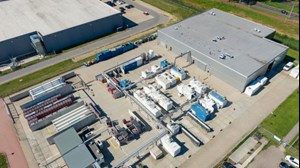News
HyGear provides PEM electrolyzer for sustainable fuel production
HyGear will deliver a 1.25-MW electrolyzer with proton exchange membrane (PEM) technology for the production of H2 that will be used in the eMethanol project: towards acceleration and demonstration of eMethanol (TANDEM). This will be the Benelux’s first eMethanol system.
This joint project between HyGear, Bright Renewables, both part of the HoSt Group, and the University of Twente, received a total of nearly €4 MM subsidy. The project, which will require an €8 MM investment, aims to develop technology for producing eMethanol, a sustainable fuel alternative to conventional fuels for heavy-duty transport, including ships and aviation. Spanning four years, the project anticipates producing its first batch of renewable methanol by the third quarter of 2025.
Henk Kleef, CEO of HyGear said, “HyGear already has an extensive experience in onsite H2 production for more than 20 years and with more than 100 systems operating worldwide based on steam methane reforming and alkaline electrolysis. The extension of the portfolio with PEM electrolysis enables us to adapt the production of H2 to the supply of renewable electricity and reduce fluctuations of the electricity grid.”
“The green H2 which is produced in this process can be used directly or used as a reactant for the production of other chemicals such as methanol in this case. We are eagerly looking forward to having this 1.25-MW system running on our premises in the coming years,” said Henk.
In this consortium, HyGear (Arnhem) is providing a 1-MW electrolyzer with PEM technology that will produce H2 through electrolysis, Bright Renewables (Enschede) is developing the methanol reactor technology, and the University of Twente (Enschede) is researching heat exchange, vital for the process, and the most optimal way for scaling up the project using a twin-test reactor. Of the total €4 MM subsidy provided, €600,000 is allocated specifically for the university’s research. The project’s total funding comes from a ‘GroenVermogenNL’ subsidy, underpinned by the ‘Nationaal Groeifonds’.
The system with a capacity of 500 tpy of grade AA eMethanol will be constructed at the site of HyGear in Arnhem, the Netherlands. Here, it will utilize electricity sourced from unsubsidized solar and wind power produced within the country. This eMethanol system is for medium-scale use and can be set up near local solar or wind farms. It can capture electricity directly, helping to reduce grid congestion. Annually, it can produce enough sustainable fuel for a large inland ship to travel 30,000 km with 10,000 containers.
Wim Brilman, professor at the University of Twente said, “We want to investigate how predictable the reactor performs under the varying availability of sustainable energy. Being able to store excess renewable electricity in the form of methanol, helps to minimize grid congestion, maximizes the potential of solar and wind farms, and provides a CO2 neutral fuel.”
Methanol, the simplest form of alcohol, is produced by combining H2 with CO2 or carbon monoxide (CO) in a reactor, also known as synthesis. As a liquid at room temperature and pressure, it serves as an efficient energy carrier or storage medium. In this eMethanol system, the CO2 will be sourced from biogenic CO2 captured from biogas plants or biomass- or waste-fired boiler plants, with H2 supplied through electrolysis.
Designed for decentralized operation, this system produces CO2-negative fuel using biogenic CO2. With legislative and regulatory momentum increasingly supporting CO2 capture to achieve national goals, there is a push towards these sustainable practices. By 2030, it is projected that 2.1 megatons of biogenic CO2 will be available for use. Additionally, decentralizing production directly at end-user sites cuts down on transportation, further enhancing the system’s efficiency and sustainability.


